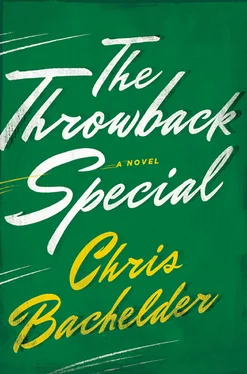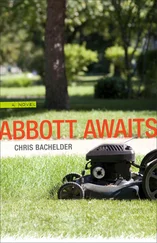TRENT HAD COME HOME to find his daughter going down on a boy. Jeff had come home to find his daughter going down on a girl. Andy had come home to find his kid doing like this with an aerosol can of whipped cream.
“Yeah, whippets,” said George, the public librarian.
Tommy had come home to find that his dog had eaten a package of diapers. The surgery was twenty-five hundred dollars, and now he had pet insurance. Nate had come home to find his wife Skyping with a man in a military uniform. Bald Michael had come home to find his son hurting a cat. Whenever Peter comes home now, his daughter is reading. He was so anxious for her to learn to read, so worried when she showed little interest, but now that’s all she does. She doesn’t even talk to Peter anymore. She just sits in corners, knobby knees pulled up to her chin, the book held over her face like this, like a veil. The other men knew about books over the faces of girls. Carl came home to find his son building something with a lot of wires. Wesley came home to find that his twins had built twin snowmen. The picture was on his phone if he could only find it. Fat Michael had a friend who came home to find that the rags he had used to apply linseed oil to his furniture had spontaneously combusted, causing sixty thousand dollars of property damage. When Steven had come home, everyone in the house was just gone.
“My mother is living with us now,” Gil said. “One day I came home and I didn’t see her anywhere. I checked the backyard, but she wasn’t there. I came back in, looked in the guest room, in the den, in the basement. She wasn’t there. I was calling out for her, but there was no answer. Then upstairs I find her in the bathroom. We have those sliding glass shower doors. You know what I’m talking about?”
“They slide like this?” Steven asked.
“No, like this,” Gil said, though Steven looked skeptical. “And the doors had broken. They had just shattered. Later I looked online. Apparently, this happens. They sometimes just explode into thousands of pieces of glass. On their own. It was nothing my mother did.”
“I’ve heard of that,” Andy said.
“The glass was inches thick in the shower and all through the bathroom. It seriously looked like a beach in there. My mother was in the shower when the glass broke, and she couldn’t move. She couldn’t go anywhere. She would have sliced her feet up. So she just stood there wrapped in her towel, trapped in the shower for I don’t know how many hours. She wouldn’t really say.”
Charles, who typically did not care for Gil’s unseemly stories about his mother, began to look around the lobby for his brown canvas bag.
“Her voice was hoarse,” Gil said, “presumably from calling out to nobody. She looked like she was shivering, but she said it was just her palsy. You know what she said? She said it really wasn’t that bad because it gave her some time to think. That’s what she said. Time to think. I tried to clear a path through the glass. I swept the shards into a dustpan. I filled a garbage bag with glass . I cut my hands and knees. I was bleeding and sweating into the glittering pieces of glass. I said, ‘Mom, goddamn it, just say it was a bad day!’ I said, ‘Mom, this is bad! Just say it!’”
The woman at the front desk held a wince against the drone and pulse, the loud achievement of assembly. Soon the men would disperse, leaving behind in the lobby their scent and those curvilinear bits of dried mud that had fallen from their silly football shoes. She said it looked like the rooms were now ready. “Five total, is that correct?”
“Six,” Andy said.
“Oh, yes, six,” she said, squinting at her computer screen. “And have you gentlemen stayed with us before?” she asked.
Andy stared at the mole on the woman’s cheek. He knew there was another one on her abdomen, just below her right breast. He felt incorporeal.
“Yes,” he said. “Every year for the past sixteen years.”
“‘H AIR ON A MAMMOTH IS NOT PROGRESSIVE IN any cosmic sense,’”George said to Rick, a copyright lawyer for Prestige Vista Solutions.
“Okay,” Rick said, looking at his shoes.
“That’s Stephen Jay Gould.”
“Is it?” Rick said.
“What he means,” George said, stepping into the elevator with Rick, “is that there is no inherent or objective value —good or bad — to the woolly mammoth’s thick hair. The hair becomes valuable, or not, only within a specific context or environment. Only in an ice age would hair be favorable. Only in warmer temperatures would it be deleterious. The woolly mammoth is not, cosmically, a fit creature, and neither is its hairless counterpart. Fitness, always, means fitness within particular environmental conditions. It’s not as if you could look at both and predict which one would survive.”
Rick pushed his floor button, then pushed the door close button several times. He shifted his weight back and forth from left foot to right.
“Gould provides an interesting analogy,” George said slowly. “So you said, what, that the flea flicker was a horrible call. Well, yes and no. I would argue that you need to consider a play in its context, its environment. And the environment of a play is, to a large extent, the opposing team’s play. A play can take its form — and value and fitness — only within the medium, the crucible, of the adversary’s play. What we call a play in football is actually the reaction that occurs between two plays, which up to the point of the snap are just competing abstractions, just fantasies of domination. To call a play is simply to transmit information.”
George was pacing the car. Rick stared at the illuminated and unchanging numbers above the doors. The elevator stopped, and its doors opened to an empty hallway. Rick resolved to write an online review of these elevators.
“The plays that are called from the sidelines are speculative, abstract. The line of scrimmage is the narrow barrier between those abstractions. When the ball is snapped, the barrier dissolves and the two plays begin to act upon each other. We have confluence! From two plays the play comes into being. Each team’s playbook fantasy takes on terrestrial form. The play lives a fleeting life, like certain unstable isotopes. Each play attempts to assert dominance over the other play, by force and deception. This is why football is the most scientific of sports. A game is a series of discrete experiments. Hypothesis, observation, results, analysis, conclusion.”
The number 5 button was illuminated, but Rick jabbed it eight or nine times. Rick’s simple point in the lobby, which he now regretted making, was that if your quarterback’s bone comes out of his leg during a play, then it was a bad play.
“The Throwback Special was not a priori a bad play. Or what did you say? Dumbshit? A dumbshit play. You can’t say it was a dumbshit play merely because it didn’t work. That’s a tautology! The trick play happened to be catastrophically bad on that unseasonably warm evening on natural grass on a first and ten from near midfield against the Giants’ charging linebackers, who were drawn in, it is true, by the handoff to Riggins. And of course one of those charging linebackers was Lawrence Taylor, who was really a kind of player the league had never seen before. Taylor himself could make a lot of teams’ plays seem, what you said, fucking asinine. But every play is in fact a limitless number of plays, depending on contingency. Not just the opponent’s play, but injury, wind and weather, field conditions, crowd noise, execution, personnel, and all of the special properties of the compound that is created by the two constituent plays. Bye. Peace. This was fun.”
Читать дальше












